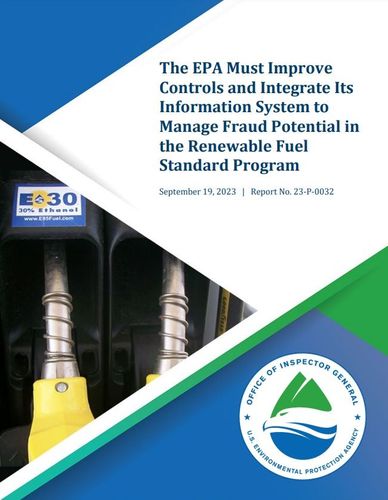EPA takes action to manage fraud potential in the RFS

SOURCE: U.S. EPA
September 20, 2023
BY Erin Krueger
The U.S. EPA has indicated its intent to further strengthen program controls and integrate its information system to manage fraud potential in the Renewable Fuel Standard in response to recommendations made by the agency’s Office of Inspector General in a report published Sept. 19.
The report explains that the OIG conducted an audit to determine whether the EPA’s Moderated Transaction System and Quality Assurance Program include controls to identify and reduce the generation and trading of invalid renewable identification numbers (RINs). According to the OIG, the EPA has documented nearly 339 million fraudulent RINs and fraudulent sales of approximately $87 million since the start of the RFS program.
The OIG found that the EPA has strengthened controls over the RFS since its inception, primarily in response to instances of companies generating and selling fraudulent RINs. The audit, however, determined that further controls are needed to ensure that only valid RINs are generated and sold on the RIN market. According to the report, the EPA has not implemented controls to prevent a producer from entering more RINs than the producer is able to generate based on its registered capacity. The agency also currently allows firms that provide RIN verification services to provide other services to producers, which the OIG said may reduce the audit provider’s independence. In addition, the OIG found that the EPA’s system for tracking and overseeing RIN reporting has not been integrated with other RIN-related systems, including the system used to track RIN transactions. Integration of these systems has been slowed by limited resources, security and confidentiality concerns, and ever-expanding RFS program data need, according to the report. The OIG said the lack of integration places a significant burden on staff to address information requests and has caused data-quality problems, including missing or incomplete reports.
The OIG’s report includes six specific recommendations to remedy these issues. First, the OIG recommends that the EPA improve adherence to the five- and 10-business-day reporting requirements for RIN transactions in RFS regulations. Second, the OIG said EPA should develop a process to identify and review instances in which RIN generation exceeds registered or reported renewable fuel production capacity. Third, the EPA is encouraged to develop a risk-based selection process to verify RIN transactions entered in the EPA Moderated Transaction System. Fourth, OIG said the agency should develop a process to reduce the likelihood of Quality Assurance Program auditor conflicts of interest during Quality Assurance Program reviews. Fifth, EPA is directed to communicate relevant requirements, expectations and consequences from RFS regulations to the Quality Assurance Program auditors to minimize the likelihood that they verify RINs that are invalid. Finally, OIG said EPA should annually review the scope of consulting services that Quality Assurance Program auditors are performing for renewable fuel producers to identify prohibited relationships.
Advertisement
Advertisement
The EPA agreed with all six recommendations. For the first three recommendations, the agency agreed to develop necessary processes and policies to improve RIN program controls and operations. For the remaining three recommendations, the EPA communicated its planned actions, as well as actions already taken, to improve the Quality Assurance Program. The OIG said it believes that the proposed corrective actions will satisfy the intent of its recommendations.
A full copy of the report is available on the OIG’s website.
Advertisement
Advertisement
Related Stories
Ethanol Producer Magazine has announced the keynote speakers for the 2025 International Fuel Ethanol Workshop & Expo (FEW) being held June 9-11, 2025, at the CHI Health Center in Omaha, Nebraska. The general session will take place June 10.
Surging biomass-based diesel feedstock demand has led to a boom in used cooking oil imports, and when combined with current policy mechanisms, U.S. soybean oil is at a disadvantage.
CARB has published additional proposed changes to its pending LCFS modifications, including those that aims to use of sunflower oil feedstock for biomass-based diesel production, and update regulations related to corn stover and biomethane.
The U.S. EPA, USDA and U.S. Food and Drug Administration on May 8 released a plan developed by the agencies to update, streamline and clarify their regulations and oversight mechanisms for products of biotechnology.
New Mexico will be the fourth state in the U.S. to pass a clean fuel standard.
Upcoming Events










